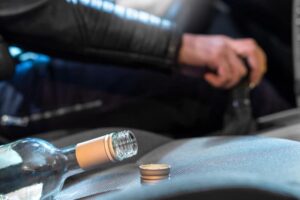
Newly sober people are often confused and shocked to learn that recovery is more than just abstinence.
“Normies” or people outside of the recovery community use the words sobriety, recovery, and abstinence interchangeably but these words all have very unique meanings to those who have embarked on a long-term journey into recovery.
Today, in celebration of National Recovery Month, let’s look at what the difference is between these words and learn how we at Transitions Recovery Program help our patients achieve permanent, long-term recovery.
What is the difference between long-term sobriety and recovery?

Sobriety or abstinence is the sustained refusal of substances. When we say that someone is “sober,” all it means is that they are not currently using. There is no long-term life change implied in the word “sobriety” or “abstinence.” Frequently, those who suffer from SUD (substance use disorder) will go through periods of abstinence using willpower alone. These efforts are admirable but they generally do not work. Eventually, they’ll hit a speed bump in life and they will fail miserably. That’s because addiction is not a weakness and long-term recovery is not actually based on willpower.
Unlike abstinence, long-term recovery is a multifaceted, sustained lifestyle change. When people who suffer from SUD make the change from abstinence to recovery, friends and family around them notice a major change in behavior. Recovery involves learning and practicing new coping skills, getting comfortable with being uncomfortable, and replacing the behaviors, places, and people associated with old, negative patterns of use with new behaviors, places, and people associated with recovery.
Common Roadblocks to Long-term Recovery

Long-term recovery is all about relapse prevention. In the disease model of addiction, relapse is a stage in the cycle of addiction where the patient mentally, emotionally, and physically, relapses and begins using their substance of abuse again. Because it is so common, relapse is considered a natural part of the disease. The vast majority of those with SUD will relapse, and repeatedly, before achieving sustained recovery.
It’s important to understand the conditions under which a relapse is more likely. Some of the warning signs include:
- Wanting to “move on” from addiction and forget about the past
- Going to fewer meetings
- Attending but not participating in your recovery program
- Feeling like you’re done “getting better”
- Losing a focus on self-care
- Feeling bored by or done with the basics of recovery
- Feeling like an “expert” in how addiction works
- Dwelling on old people, places, and things associated with past use
- Wondering if you ever were addicted in the first place
- Scheming on how to re-introduce “controlled” use and minimize negative consequences
These warning signs set the stage for relapse. Frequently these mental and emotional relapse markers will begin months or even years before a physical relapse takes place. Often, patients will point to a particularly stressful event—a death, a breakup, or a financial crisis, for example—as the “cause” of their relapse, when in actuality the relapse began internally long before the final external tipping point came to pass.
Making a Relapse Prevention Plan

Because relapse is a part of the disease of addiction, at Transitions Recovery Program we make relapse prevention planning part of our treatment program. This starts with educating patients about the disease model of addiction and teaching them to recognize the signs of relapse before they start. In all stages of recovery, this means avoiding becoming “Hungry, Angry, Lonely and Tired” (HALT) by practicing good self-care. Remembering to eat well, practice healthy coping skills, stay connected to your recovery community, and maintain good sleep hygiene goes a long way to preventing relapse.
While HALT-based strategies are a good general rule of thumb for all patients, at Transitions Recovery Program, we make relapse prevention planning an interactive and personalized process for each patient. Good relapse prevention plans consider questions like: “What are your personal relapse triggers?,” “What can you do day-to-day to avoid these triggers?,” “What are the names and numbers of three people you can call when you feel at-risk of relapsing?,” “What are three activities you can do when you feel at-risk of relapsing?,” etc. Writing out an action plan and keeping a paper or digital copy on-hand can be invaluable when you begin experiencing early relapse.
Continuing Care at Transitions Recovery Program

At Transitions Recovery Program, we recognize that recovery doesn’t end the minute you walk out the door—in fact, it’s just beginning. Recovery is a lifelong process of managing the chronic disease of addiction. When you complete treatment with us, we continue to support your recovery with a variety of weekly meetings and programs designed to bolster your journey into a permanent recovery lifestyle.
The Transitions Recovery Program Alumni Association
The Transitions Recovery Program alumni association is a group for our extended family of alumni to stay connected and celebrate each other’s continued success. We host reunions and other meetings for our alumni so that previous patients can reconnect with their early recovery community and share what’s worked and what hasn’t worked since they’ve left treatment.
Ongoing Family Support
Getting the family involved in the process of family recovery is imperative for lasting recovery. At Transitions Recovery Program, we offer two ways for family to stay involved in the recovery process after rehab is complete.
Our Family Support Group is held every Tuesday from 6:30 p.m. – 8:00 p.m. we offer an ongoing, open-ended family group designed to provide support, encouragement, and a safe place to share pain and joy. New people are always welcome, and many attend regularly.
Our Multi-Family Group Meetings are held every Saturday morning at 9:30 am. These meetings feature lectures, films, experiential exercises, and safe-space sharing.
In addition, all Transitions Recovery Program families are encouraged to attend Al-Anon, Nar-Anon or CODA support groups.
Helping You Secure Outside Support
As part of the relapse prevention planning process, we will help you identify and cultivate support structures outside of treatment so that your transition from treatment to your everyday routine at home is as seamless as possible. Because we are a 12-step based program, for most of our alumni that means identifying AA and/or NA home groups to attend in their community. It also means learning the process for choosing a sponsor who can help work with you one-on-one in your program over the long term.
Getting Sober Isn’t a “One and Done” Activity
Learning that recovery is a lot of work—and that work never stops!—can feel overwhelming. That’s natural—everyone feels overwhelmed at first. Just remember that millions of people do it every day and you can, too.
At Transitions Recovery Program, we make it our business to take the guesswork and uncertainty out of recovery and put you back in the driver’s seat. When you’re ready to experience the joy and peace of long-term sobriety, give us a call at 800-626-1980.
This content was written by addiction treatment counselor Erin Gilday.

















